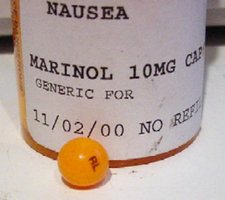Marinol
Marinol, a registered trademark of Unimed Pharmaceuticals, Inc. is the commercial name for a product containing dronabinol, which is synthetic Δ9-tetrahydrocannabinol. more...
Δ9-THC is a naturally occurring component of marijuana.
Marinol is the only FDA-approved cannabinoid and is prescribed as an appetite stimulant, primarily for AIDS and chemotherapy patients. Compare Sativex, a mouth spray for neuropathic pain of multiple sclerosis sufferers approved for use in Canada.
Many users complain that not only is the cost of Marinol greater than the cost of the amount of marijuana needed to produce the same effect, but it is also lacking in many of the properties of the whole plant, which contains hundreds of different cannabinoids. However, Marinol is available for free to those who can demonstrate their financial need to Roxane and Unimed Pharmaceuticals. In addition, it takes over an hour for Marinol to reach full effect, but its duration is longer and it is available in controlled dosages, avoiding the uncontrolled strengths that occur when smoking marijuana. It is difficult to maintain an exact level of effect (which is important to most medical users), as well as making its use difficult for people suffering from nausea and vomiting, since they often expel the medication before it takes effect.
Regulatory history
Since at least 1986, the trend has been for THC in general, and especially the Marinol preparation, to be downgraded to less and less stringently-controlled Schedules of controlled substances, in the U.S. and internationally.
On July 13, 1986, the Drug Enforcement Administration issued a Final Rule and Statement of Policy authorizing the "Rescheduling of Synthetic Dronabinol in Sesame Oil and Encapsulated in Soft Gelatin Capsules From Schedule I to Schedule II"(DEA 51 FR 17476-78). This permitted medical use of Marinol, albeit with the severe restrictions associated with Schedule II status. For instance, refills of Marinol prescriptions were not permitted. At its 1045th meeting, on April 29, 1991, the Commission on Narcotic Drugs, in accordance with article 2, paragraphs 5 and 6, of the Convention on Psychotropic Substances, decided that delta-9-tetrahydrocannabinol (also referred to as delta-9-THC) and its stereochemical variants should be transferred from Schedule I to Schedule II of that Convention. This released Marinol from the restrictions imposed by Article 7 of the Convention.
An abstract published in the April-June 1998 issue of the Journal of Psychoactive Drugs found that "Healthcare professionals have detected no indication of scrip-chasing or doctor-shopping among the patients for whom they have prescribed dronabinol". The authors suggested that Marinol had a low potential for abuse.
In 1999, Marinol was rescheduled from Schedule II to III of the Controlled Substances Act, reflecting a finding that THC had a potential for abuse less than that of LSD, cocaine, and heroin. This rescheduling comprised part of the argument for a 2002 petition for cannabis rescheduling in the United States, in which petitioner Jon Gettman noted, "Cannabis is a natural source of dronabinol (THC), the ingredient of Marinol™, a Schedule III drug. There are no grounds to schedule cannabis in a more restrictive schedule than Marinol™".
Read more at Wikipedia.org



